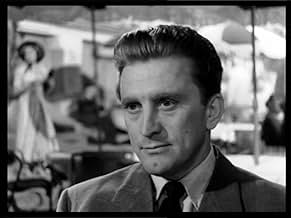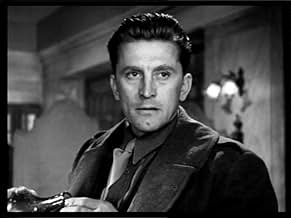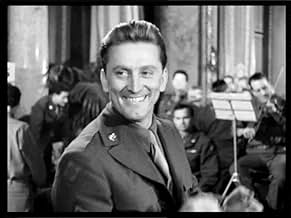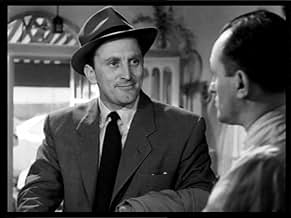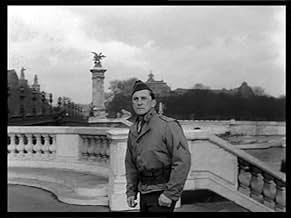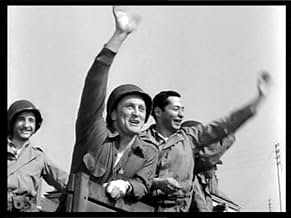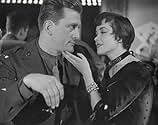AVALIAÇÃO DA IMDb
6,5/10
603
SUA AVALIAÇÃO
Adicionar um enredo no seu idiomaA former soldier on holiday in the French Riviera recalls his time in France during WWII, and his love for a French peasant woman.A former soldier on holiday in the French Riviera recalls his time in France during WWII, and his love for a French peasant woman.A former soldier on holiday in the French Riviera recalls his time in France during WWII, and his love for a French peasant woman.
- Direção
- Roteiristas
- Artistas
Martine Alexis
- Une prostituée à la Conciergerie
- (não creditado)
Edmond Ardisson
- L'hôtelier de Villefranche-sur-Mer
- (não creditado)
Marc Arian
- Un parisien qui fait fête aux soldats américains
- (não creditado)
Grégoire Aslan
- Le policier français au bistrot Aux Deux Anges
- (não creditado)
- Direção
- Roteiristas
- Elenco e equipe completos
- Produção, bilheteria e muito mais no IMDbPro
Avaliações em destaque
7B24
How truly odd it is that so little attention to this film is evident in these archives. Apart from some quibbles one might have with its casting, the occasionally stilted dialogue, or some melodramatic nonsense here and there, it really is an important addition to the Kirk Douglas oeuvre as well as a story about a character very much like those he played later in "Paths of Glory" and "Lonely Are the Brave."
Douglas must have had more than a passing hand in choosing roles for himself during his career. Unlike many of his contemporaries (Brando comes to mind), he has played characters that require a fine balance between kinetic displays of a true hero and moments of self-effacing and troubled doubt. It is not so much the quality of the writing at work here as it is his own deliberate and skillful willingness to interpret the role honestly, without regard to any supposed preconceptions of what his audience expects of him.
I write this with a degree of reservation, because I never much cared for his voice or his looks. The fact that I admire his acting skill is perhaps all the more enhanced by this admission, however. With a profile a little less vivid and a better vocal range and timbre, he might have played Shakespeare.
His French colleagues in the present effort are more stereotypical than one cares for. They are made to speak a kind of pidgin English that was generally thought acceptable in 1953 for American audiences. Subtitles accompanying actual French would be requisite for any remake.
Moreover, there is that recurrent tinge of sentimentality and bathos. But I still liked it on the whole, giving it a solid 7 out of 10.
Douglas must have had more than a passing hand in choosing roles for himself during his career. Unlike many of his contemporaries (Brando comes to mind), he has played characters that require a fine balance between kinetic displays of a true hero and moments of self-effacing and troubled doubt. It is not so much the quality of the writing at work here as it is his own deliberate and skillful willingness to interpret the role honestly, without regard to any supposed preconceptions of what his audience expects of him.
I write this with a degree of reservation, because I never much cared for his voice or his looks. The fact that I admire his acting skill is perhaps all the more enhanced by this admission, however. With a profile a little less vivid and a better vocal range and timbre, he might have played Shakespeare.
His French colleagues in the present effort are more stereotypical than one cares for. They are made to speak a kind of pidgin English that was generally thought acceptable in 1953 for American audiences. Subtitles accompanying actual French would be requisite for any remake.
Moreover, there is that recurrent tinge of sentimentality and bathos. But I still liked it on the whole, giving it a solid 7 out of 10.
Many things about this movie are charming and have a wistful quality that brings you into its story.
First of all, and I offer my apologies to the absorbing performances, to me the most fascinating aspect of this film is the location; PARIS. But not just any Paris. This is a during and post-WWII Paris. Although released an amazing 8 years after the end of the war, much of the charm of a Paris which lingers in our hearts is still there. This is not travelogue picture with dancing Americans to a Rodgers score. There is a very true-to-life depiction of, what I call, the most elegant city in the world.
This movie tempts us to fall in love again with Paris. All politics aside, please. We see a Paris which many a serviceman or woman probably fell in love with during the war. We see the sights in and around Paris, there are some views of Fontainebleau just outside of the city which make me want to go back and suffer the awful Summer heat inside of it again just to see the gorgeous architecture there.
Second, I liked this story because it ran true. It has few Hollywood formulas -- even to the end it tempts us to see stories like these as they really were. Some happy, some not so. Another reviewer complained about "pidgin French - English" which was heard throughout the movie. I must say that whatever it was, it did not offend my ears and I have friends who live in Paris and have similar accents when they speak English. The accents did bother me -- and neither did the French without subtitles. I do remember a time when Americans knew more about the French language and were proud of it. I still am.
Yet, all through this we have a love story which develops and then unravels due to bureaucratic entanglements.
Finally, if you must see this for one reason, see it for the story and the deft performances. Kirk Douglas, it seems, never made a bad picture - or at least he never gave a bad performance. Every one was absorbing - brought you in, gave you permission to involve yourself with the situations in them. This is not exception. It is a low-key performance, true. But it is no less absorbing than anything he ever did.
Of course there was gorgeous Dany Robin as Kirk Douglas's love interest. Her portrayal of a shy, innocent French girl was perfect considering she was voted "nastiest French actress" that same year. She had a fabulous French career and worked with many famous directors, including Litvak, who also directed "Sorry, Wrong Number", "The Snake Pit" and "Anastasia".
I recommend this to those viewers who still have a little romance in their hearts - but walk with a dose of reality down every turn of their adventures.
First of all, and I offer my apologies to the absorbing performances, to me the most fascinating aspect of this film is the location; PARIS. But not just any Paris. This is a during and post-WWII Paris. Although released an amazing 8 years after the end of the war, much of the charm of a Paris which lingers in our hearts is still there. This is not travelogue picture with dancing Americans to a Rodgers score. There is a very true-to-life depiction of, what I call, the most elegant city in the world.
This movie tempts us to fall in love again with Paris. All politics aside, please. We see a Paris which many a serviceman or woman probably fell in love with during the war. We see the sights in and around Paris, there are some views of Fontainebleau just outside of the city which make me want to go back and suffer the awful Summer heat inside of it again just to see the gorgeous architecture there.
Second, I liked this story because it ran true. It has few Hollywood formulas -- even to the end it tempts us to see stories like these as they really were. Some happy, some not so. Another reviewer complained about "pidgin French - English" which was heard throughout the movie. I must say that whatever it was, it did not offend my ears and I have friends who live in Paris and have similar accents when they speak English. The accents did bother me -- and neither did the French without subtitles. I do remember a time when Americans knew more about the French language and were proud of it. I still am.
Yet, all through this we have a love story which develops and then unravels due to bureaucratic entanglements.
Finally, if you must see this for one reason, see it for the story and the deft performances. Kirk Douglas, it seems, never made a bad picture - or at least he never gave a bad performance. Every one was absorbing - brought you in, gave you permission to involve yourself with the situations in them. This is not exception. It is a low-key performance, true. But it is no less absorbing than anything he ever did.
Of course there was gorgeous Dany Robin as Kirk Douglas's love interest. Her portrayal of a shy, innocent French girl was perfect considering she was voted "nastiest French actress" that same year. She had a fabulous French career and worked with many famous directors, including Litvak, who also directed "Sorry, Wrong Number", "The Snake Pit" and "Anastasia".
I recommend this to those viewers who still have a little romance in their hearts - but walk with a dose of reality down every turn of their adventures.
Although a co-production ,although it has a French title and features plenty of French luminaries,the film fell into oblivion in France.It's barely mentioned in the dictionaries of movies .
It was Anatole Litvak's return to France,where he had made some of his thirties movies ("L'Equipage" ,definitely a movie to rediscover, "Mayerling" the remake of which was filmed by Terence Young in 1968 or "Coeur de Lilas").But although I expected much of this film,I must admit I was disappointed.Particularly after watching his absorbing "decision before dawn" ,the movie he made just before "Un Acte d'Amour" The main problem is language:it's not very smart to make the French speak English between them.It's not a problem for a foreign audience,but for the French one it is one: Dany Robin and Serge Reggiani speaking English together is downright embarrassing.Not that their English is bad,but it is impossible to believe in THAT Paris,where almost everybody ,from a humble waitress to the hookers,speaks fluent English .And why didn't Litvak use Douglas' linguistic abilities?I once saw an interview during the Festival de Cannes and his French was quite good.
The French outnumber their American co-stars:Fernand Ledoux,Gabrielle Dorziat (whom Litvak had already directed in 'Mayerling" where she was miscast as Elizabeth "Sissi" from Austria),Dany Robin (who would be part of Hitchcock's "Topaz") ,the highly superior Reggiani (whose English delivery is much faster than when he speaks French: one should note he never says a single word in his first language,which is unlikely),and Brigitte Bardot (wearing braids) who appears in two short sequences as a waitress .
The best of this mushy story (the scene in the prison with a ridiculous voice over takes the biscuit when the young pure heroine winds up in the lions den (that is to say a cell with prostitutes)takes place in the prologue and in the epilogue :Douglas comes back to a place his love was happy when she was sixteen on the Cote d'Azur and he remembers her words .The meeting with his former superior and his wife,the room where the soldier feels nostalgic for a time that never was ,all this has Sirk accents and makes me feel the movie could have easily been boiled down into a good short.
It was Anatole Litvak's return to France,where he had made some of his thirties movies ("L'Equipage" ,definitely a movie to rediscover, "Mayerling" the remake of which was filmed by Terence Young in 1968 or "Coeur de Lilas").But although I expected much of this film,I must admit I was disappointed.Particularly after watching his absorbing "decision before dawn" ,the movie he made just before "Un Acte d'Amour" The main problem is language:it's not very smart to make the French speak English between them.It's not a problem for a foreign audience,but for the French one it is one: Dany Robin and Serge Reggiani speaking English together is downright embarrassing.Not that their English is bad,but it is impossible to believe in THAT Paris,where almost everybody ,from a humble waitress to the hookers,speaks fluent English .And why didn't Litvak use Douglas' linguistic abilities?I once saw an interview during the Festival de Cannes and his French was quite good.
The French outnumber their American co-stars:Fernand Ledoux,Gabrielle Dorziat (whom Litvak had already directed in 'Mayerling" where she was miscast as Elizabeth "Sissi" from Austria),Dany Robin (who would be part of Hitchcock's "Topaz") ,the highly superior Reggiani (whose English delivery is much faster than when he speaks French: one should note he never says a single word in his first language,which is unlikely),and Brigitte Bardot (wearing braids) who appears in two short sequences as a waitress .
The best of this mushy story (the scene in the prison with a ridiculous voice over takes the biscuit when the young pure heroine winds up in the lions den (that is to say a cell with prostitutes)takes place in the prologue and in the epilogue :Douglas comes back to a place his love was happy when she was sixteen on the Cote d'Azur and he remembers her words .The meeting with his former superior and his wife,the room where the soldier feels nostalgic for a time that never was ,all this has Sirk accents and makes me feel the movie could have easily been boiled down into a good short.
More than any other movie I've seen, this one draws a dark picture of what the statistical enormity and bureaucratic obscenity of WWII did to individuals during (and after) the Second World War. This is a love story set against the new way of dealing with the logistics of millions of people on the move in wartime Europe -- on either side. The big point is that it's difficult to draw a line between the sides in the brutal impersonality of the events that crush people like the characters in this story.
Kirk Douglas is great, of course, and the direction in the film is always intersting. Hard to believe this was made as late as 53.
See this if you can -- I saw it on TCM recently in a Kirk Douglas festival. For that matter, watch all the Kirk Douglas flicks you can -- the guy had either great taste or great luck.
Kirk Douglas is great, of course, and the direction in the film is always intersting. Hard to believe this was made as late as 53.
See this if you can -- I saw it on TCM recently in a Kirk Douglas festival. For that matter, watch all the Kirk Douglas flicks you can -- the guy had either great taste or great luck.
More than any other movie I've seen, this one draws a dark picture of what the statistical enormity and bureaucratic obscenity of WWII did to individuals during (and after) the Second World War. This is a love story set against the new way of dealing with the logistics of millions of people on the move in wartime Europe -- on either side. The big point is that it's difficult to draw a line between the sides in the brutal impersonality of the events that crush people like the characters in this story.
Kirk Douglas is great, of course, and the direction in the film is always intersting. Hard to believe this was made as late as 53.
See this if you can -- I saw it on TCM recently in a Kirk Douglas festival. For that matter, watch all the Kirk Douglas flicks you can -- the guy had either great taste or great luck.
Kirk Douglas is great, of course, and the direction in the film is always intersting. Hard to believe this was made as late as 53.
See this if you can -- I saw it on TCM recently in a Kirk Douglas festival. For that matter, watch all the Kirk Douglas flicks you can -- the guy had either great taste or great luck.
Você sabia?
- CuriosidadesKirk Douglas also did the French language version's dialogue.
- Citações
Robert Teller: The River Seine. All my life I wanted to see it. Finally I saw it, with a gun in my hand. Travel, twentieth-century style.
Principais escolhas
Faça login para avaliar e ver a lista de recomendações personalizadas
- How long is Act of Love?Fornecido pela Alexa
Detalhes
- Data de lançamento
- Países de origem
- Idiomas
- Também conhecido como
- Mais Forte do que a Morte
- Locações de filme
- Empresas de produção
- Consulte mais créditos da empresa na IMDbPro
- Tempo de duração1 hora 35 minutos
- Cor
- Mixagem de som
- Proporção
- 1.37 : 1
Contribua para esta página
Sugerir uma alteração ou adicionar conteúdo ausente

Principal brecha
By what name was Mais Forte que a Morte (1953) officially released in India in English?
Responda
